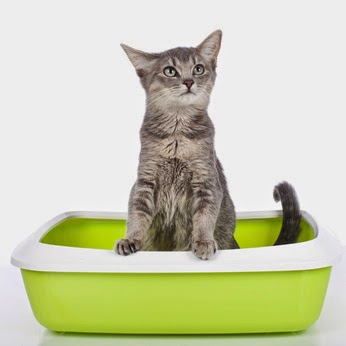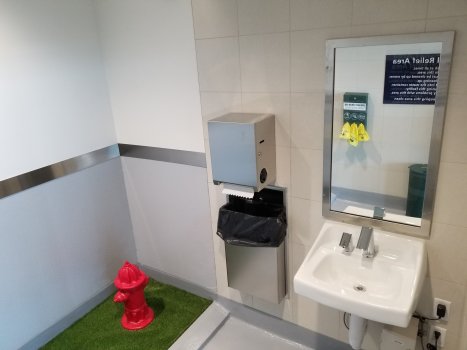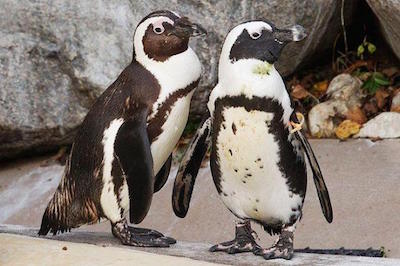Getting "Wild" With Singer Paul Rodgers
Front man for the band Bad Company, Free and The Firm, singer, songwriter Paul Rodgers is an extreme supporter of our four-legged friends. Aside from the 6 cats and a dog at home, he sponsors moose, bears, coyotes, foxes, a lynx, a bobcat and raccoons. "Supporting animals, in any way that one can, restores the soul," say Rodgers. His wife and obvious muse, Cynthia joins Paul for this interview.
 While Paul and Cynthia currently have six cats, they explain that they have had many more than that at a time, as they do rescues. All of their rescues have their various stories. They even have two from Mexico where they did a number of rescues. When they went down to Mexico, they saw horrific things going on with cats and dogs. They stepped up and brought a whole bunch back. Cynthia says there were meeting people at the Vancouver International Airport upon their return and she and Paul were passing off cats to them, sort of like international cat runners!
While Paul and Cynthia currently have six cats, they explain that they have had many more than that at a time, as they do rescues. All of their rescues have their various stories. They even have two from Mexico where they did a number of rescues. When they went down to Mexico, they saw horrific things going on with cats and dogs. They stepped up and brought a whole bunch back. Cynthia says there were meeting people at the Vancouver International Airport upon their return and she and Paul were passing off cats to them, sort of like international cat runners!
Another time they were bringing back cats from Mexico and going through the Los Angeles Airport. Between the two of them they had nine cats and cat carriers. They were stacked up like the leaning tower of Pisa as they went through customs.
Everywhere they go they tend to run into animals that need feeding or watering or veterinarian care. They've taken care of cats in faraway places like Japan and Portugal. They tell us the story of when they were in Portugal. They were going out for dinner with a group of people all dressed up for dinner and all of a sudden they were walking along and a bird falls from the sky and lands right in front of Cynthia. Everyone thought that figures, it would not land in front of anyone else other than Cynthia and Paul. They ended up taking the bird to the restaurant with them and Cynthia kept it on her lap. They've also rescued a dog in Memphis, which ended up going home with Paul's producer and was named Memphis Grace.
Surprisingly, Cynthia tells us she is actually allergic to cats. She tells us she gets her "breathe" time when they're on the road and at night, because they don't come into their bedroom. Because cats are not herd animals, they're not designed to be together. So two cats live upstairs and one lives downstairs. Two cats live together in a room and then another two in another room. They all have outdoor areas that are enclosed so they can go out and get sunshine and one of their old girls just lays on in the windowsill and lets the sun warm her old bones.
Paul tells us about two other young cats, Addie and Patty, that they were fostering. They say the name Addie is short for adventure. Paul asked Cynthia if they were keeping her, because she had a tendency to look deep into his soul. Cynthia said the same thing happened to her. In the end, they were foster failures and kept the two of them.
One time when Cynthia time was feeding the cats in the kitchen, Paul said, "How many cats do we have?" Cynthia said 12, but Paul corrected her and said he just counted 15. Cynthia then responded that they weren't keeping all of them and that she was going to find homes for some of them. Paul explains that you only really see them all together is at feeding time. Other than that, you really don't notice how many there truly are.
 Paul explains that it was originally Cynthia who was the rescuer. He says they had been staying together for a little while and she came home one time with three kittens. He then suspected she was a rescuer. And, he admits he likes it and it is fine with him!
Paul explains that it was originally Cynthia who was the rescuer. He says they had been staying together for a little while and she came home one time with three kittens. He then suspected she was a rescuer. And, he admits he likes it and it is fine with him!
The hardest part, though, is when they pass. They've had to say goodbye to many cats as well as their dog. As Cynthia says, there's a heart and soul connection to animals.
One day Cynthia's niece came over to their house and said that they should set up like a sanctuary. Cynthia told her to look around. The furniture's covered in plastic with white sheets over it, it already is a sanctuary! Her niece said that's not what she meant; she said they should have a name for their place. Cynthia told her it does have a name. It's called, "All Right Meow!" Paul commented that he needs to write a new song about it.
Paul and Cynthia are not only involved with cats and dogs, but also with wildlife. They tell us that when they finished the Free Spirit Tour, they couldn't come home because the area was on fire and there was too much smoke. So they went to the Muskokas for nine days and rented a little place on the lake. Five years ago was their first visit to Lake Rosseau, which is where the Aspen Valley Wildlife Sanctuary is, which they now support.
They tell us about a story that received international attention about three bear cubs that were found in a washroom in the national park in Alberta. It was thought that someone killed the mother and put the babies there. Or, someone had found the babies and put them in the loo, knowing that the warden would find them. The cubs were less than three pounds each when they were found. In the province of Alberta at that time, they would not rehabilitate any orphaned wildlife and they would be euthanized.
So the warden took it upon himself to contact Aspen Valley Wildlife Sanctuary. WestJet, the local airline, flew the animals out to the Aspen Valley Wildlife Sanctuary and they basically nurtured them for a year. A bear can't be released the first year of its life to the wild, because the mother would be with it at that time and instructing it how to hibernate, how to fuel up all of that. And without that, a bear would not survive its first year alone. It's impossible. So the Aspen Valley Wildlife Sanctuary spent one winter with them and coaching them. They even had someone wear a costume that smelled of bear along with masks.
These babies got larger and larger and got to the point where were trying to climb up the people when they were about 40 pounds. The cubs were ready and were released in July of this year. So they've had their first year and they've got tracking devices on them and they're all doing well. And the best part of all is now they've changed their rules in Alberta and will try to rehabilitate these orphans instead of just euthanizing them, since its been proven it can be done. These animals can be reared and then put back in the wild, which is a beautiful thing. Cynthia tells us she is going to work on a story about the three bears, because it's a different three bear story than the one that we all know.
At the Aspen Valley Wildlife Sanctuary, they have every type of animal there. They have a moose named Ella, whose mother had three calves. Generally they have two, so she couldn't nurse three. She then ended up abandoning one. A family found this young Moose and they took it home. They didn't know the right combination of protein or even how much protein it needed, so they fed it what they thought would work. As the moose became livelier, she was jumping around and broke her hind leg. So they called the Aspen Valley Wildlife Sanctuary and said, look, we've done this, we know we're not supposed to keep wildlife, but now we're really in a pickle here. So the Aspen Valley Wildlife Sanctuary took Ella and they had to cast her leg. As a result, her front legs are now fairly weak, so she can't be released back to the wild. It would be cruel. She's now the resident Moose.
 The keeper there, named Howard, is a biologist and he speaks "Moose." He can make a certain sound and Ella will respond. While Cynthia and Paul were there, he called Ella and she came out to greet them. Howard then fed her a whole banana, which she ate. But when Paul was feeding her, she looked at him and her eyes just said, "Can you just hold it for me?" This is because they don't have bottom teeth. They usually tear foliage from a tree and that's how they eat. Paul then held the banana and she was able to tear at it with her top teeth. Cynthia said Ella was very sweet and she kissed her on her velvety nose. Paul said it was interesting to see that she was still a baby, but she was enormous and around 200 pounds.
The keeper there, named Howard, is a biologist and he speaks "Moose." He can make a certain sound and Ella will respond. While Cynthia and Paul were there, he called Ella and she came out to greet them. Howard then fed her a whole banana, which she ate. But when Paul was feeding her, she looked at him and her eyes just said, "Can you just hold it for me?" This is because they don't have bottom teeth. They usually tear foliage from a tree and that's how they eat. Paul then held the banana and she was able to tear at it with her top teeth. Cynthia said Ella was very sweet and she kissed her on her velvety nose. Paul said it was interesting to see that she was still a baby, but she was enormous and around 200 pounds.
Cynthia and Paul tell us that they are also patrons of an animal sanctuary in Aberdeen, Scotland, called Willows. That really has their hearts and they've been supporting them for probably about seven years now. They do a lot of good work but they're in a very repressed area of Scotland. Cynthia and Paul often do fundraisers for them and hold online auctions. They've kept them going for the last three years by heavily funding them and shaming their friends into making donations as well. She tells people that they don't have to be in their pet book, but if they would like to make a hefty donation, that would be welcome!
Cynthia and Paul definitely have a genuine passion for the animals! Check out Paul's 2018 solo release "Free Spirit," recorded live at London's Royal Albert Hall.
Visit Website
How to Build the Perfect Litter Box - Dr. Debbie
 One sniff upon entering your home and you recognize the unmistakable odor of cat urine and feces. Simba has used your entry hall as his litter box again. But before you lose your temper - stop. By scrutinizing the environment through your cat's eyes, you will likely discover the cause of his toileting mishaps.
One sniff upon entering your home and you recognize the unmistakable odor of cat urine and feces. Simba has used your entry hall as his litter box again. But before you lose your temper - stop. By scrutinizing the environment through your cat's eyes, you will likely discover the cause of his toileting mishaps.
Elimination issues are a main reason for veterinary visits and a primary reason for relinquishment of cats at shelters. House soiling problems can be multi-factorial, with an overlap of behavioral, environmental and medical causes. Feline house soiling can be managed however with sleuth work and patience. The challenge is to think like a cat.
First and foremost, say this and repeat it…"My cat does not eliminate out of the litter box to get even with me." Cats do use urine and fecal scent marks to communicate territory, but this isn't done with spite or in effort to "get even" with you. Inappropriate elimination is a cat's way stating that something isn't right in their world. Understanding this is key before tackling feline house soiling. Focus on what's wrong in Simba's toilet area, not on how the house soiling makes you feel.
Start With a Vet Check
Cat owners often struggle with house soiling mishaps for months or years before enlisting help from their veterinarian. But seeing the veterinarian should be the first step, since health disorders may be at the root of some house soiling issues. Your efforts in restoring litter box usage will be doomed if an underlying medical cause is not addressed at the same time.
Size Does Matter
Make sure your cat's litter box is of adequate size to allow maneuvering. Litter box size should be 1 ½ times the length of cat's body length. Height of the edge also matters. For older kitties, try lower profile litter boxes or plastic under bed storage boxes. An arthritic older cat won't complain or cry in pain with arthritis, she'll just chose to eliminate elsewhere.
Consider the View
Cats don't want to be startled while in the loo. Don't place the litter box in a high traffic area where people and pets are always a-coming and going. Cats prefer a low traffic area where they can have an eye out on things.
Don't place the litter box near appliances which give off noise, vibration and heat, all which disturb your cat while eliminating. Once a negative aversion is created, your cat may not return to use that box in the future.
 Ditch the Litter Box Cover
Ditch the Litter Box Cover
While some nervous kitties prefer the privacy of litter box covers, the majority of cats dislike the tight quarters and limited ventilation litter box covers provide. Consider how you feel in a public porta-potty. Do you like to touch the walls when inside? Sure, people like the way the lid contains odors, but does it really matter how little odor comes from the litter box when your cat is pooping on your oriental rug?
Provide More Than One Box
A common error is assuming that one litter box is all your cat needs. What cat owner loves the litter box, and relishes seeing more of them in the home? But the more the better when it comes to faithful litter box usage, especially with multiple cats. The general rule is to provide one more box than the number of cats. Some cats share litter boxes, others will not. Unless you provide alternate sites you may have elimination issues in multiple cat homes.
Another special consideration is differences in cat's personalities - timid cats may avoid crossing paths with other more assertive pets in home. Be sure to provide litter box sites that won't be blocked by other animal's movements.
If you live in a multilevel home - you must provide litter box sites on each level. This is especially important in multi-cat homes, those with senior cats or those with health conditions.
The Pick of Litters
Litter texture preferences vary and there are many choices from scoopable, clay, crystals, or natural litters. However in one research study of cat's litter box habits, it demonstrated that the majority of cats prefer fine grained scoopable clay based litters that have carbon as their odor absorbing ingredient. Every cat is different though, so try other litter varieties until you find your cat's preference.
Skip the Scents
The verdict is still out on what odors cats prefer, but avoid heavily scented litters or deodorizers if your cat is missing the box. Interestingly enough, one study showed cats preferred cedar and fish odors, while avoiding citrus and floral scents, while another study concluded cats preferred fish or bleach smells to other scents.
Kitty Litter Depth
Ideal litter depth is 2 inches - more isn't always better. Some cats thrive on scratching the bottom of the pan, which is obscured by excessive amounts of litter.
Keep It Clean
Cats are fastidious by nature and will avoid using a soiled or smelly box. The overall cleaning frequency depends on the number of cats in the home. General advice is to scoop twice a day and deep clean the litter pan weekly. Change out clumping litter every 2-3 weeks.
Build It and Kitty Will Use It
By building your cat's dream litter box, your cat will find litter box nirvana. And you'll come to enjoy a better relationship with your kitty family members without those unwanted "presents" in the foyer.
Featured veterinarian known as "Dr. Debbie" on national pet radio program, Animal Radio. Ebook author of "Yorkshire Terriers: How to Be Your Dog's Best Friend"; "Pugs: How to Be Your Dog's Best Friend"; "Mini Schnauzers: How to Be Your Dog's Best Friend"; and "Shih Tzu: How to Be Your Dog's Best Friend." Dr. Debbie's books.
Visit Website
Animal Radio News - Lori Brooks
 How Dogs Process Words
How Dogs Process Words
Scientists at Emory University in Atlanta, Georgia, have conducted one of the first studies using brain imaging of dogs to figure out how they process words, specifically words they've been taught to associate with objects, like a ball. It's unclear whether the word ball, or any other word for an object, simply means, "pay attention," or if the dog actually pictures the actual object. The lead researcher of the study says, "We know that dogs have the capacity to process at least some aspects of human language since they can learn to follow verbal commands," but, he says, "Previous research suggests dogs may rely on many other cues to follow a verbal command such as gaze, gestures and even emotional expressions from their owners." That explains why some dogs need to be told a command more than once. What the experts saw in the brain imaging was a surprise and the opposite of research on humans. This is because people typically show greater neural activation for known words than new words, while dogs, always being eager to please people and get that treat or praise, may be reacting more to the unfamiliar words because they sense their owner wants them to understand.
Snapchat Wants Your Cat
Social media platform Snapchat has been hemorrhaging as many as three million daily users in the last three months. Now, they want your pet, specifically your cat. Snapchat filters can now recognize cats. Cats aren't the first pets that Snapchat's filters can recognize. Last year the company introduced object recognition including food, sports equipment and certain dog breeds. The company is finally giving cats their due.
 Oakland Airport Has New Service Dog Potty Area
Oakland Airport Has New Service Dog Potty Area
There's relief for those people who have service dogs and need to travel through Oakland International Airport in California. The airport's Terminal 2 had its grand opening for a brand new, $650,000 indoor service animal relief area. The new space includes a 100-square-foot ventilated room with a sink, poop bags, artificial turf and a mini fire hydrant. Dogs for Diabetics, a group that pairs medical alert dogs with insulin-dependent diabetics, assisted on the project, hoping to create an area that would make traveling with service animals more enjoyable and less stressful for dogs and their handlers.
Leave The Dogs In The Bedroom - Especially If You Have Chronic Pain
New research out of Canada suggests sleeping with or near pets can improve rest for people who suffer from long-term chronic pain. As part of a larger University of Calgary study on the impact of dog ownership for people with chronic pain, the University examined the specific impact of dogs on the quality of their sleep. What they found was, physiologically, pain and sleep are quite closely related in the neural pathways that they use. So basically, if you have pain, you're obviously not as likely to sleep as well. But what they learned was those who are sleep deprived also experience pain more intensely. Dogs can help, because they offered several positive benefits such as enforcing a routine, getting some outdoor activity and providing companionship. The lead researcher on the sleep portion of the study says, "Good practice will say remove animals from the bedroom. And the thinking is there are less distractions, less exposure to allergens, but it's not very sophisticated advice and doesn't take into consideration the context of people's lives, nor how important (pets have become) in people's lives."
 Same Sex Penguin Partners
Same Sex Penguin Partners
A few months ago, staff at the Sea Life Sydney Aquarium in Australia noticed a new romance blossoming between two male Gentoo penguins named Sphen and Magic. They've been spotted going for swims together and bowing to one another, a sign that they were both interested in being more than just friends. Now, the same-sex penguin partners have taken their relationship to the next level and are incubating a foster egg taken from another nest.
This Is Why Pets Should Have Rabies Shots
Health officials in Florida have issued a 60-day alert in Miami-Dade County after a second cat tested positive for rabies this year. An earlier alert was issued following the discovery of the first rabid cat in North Miami Beach. Because of these cases, one person is receiving rabies treatment after trying to deal with an unvaccinated stray cat. Another person is being checked following a cat scratch. Beside the two cats, six rabid raccoons were found on Miami Zoo land over the summer.
 Listen to the entire Podcast of this show (#1041)
Listen to the entire Podcast of this show (#1041)





